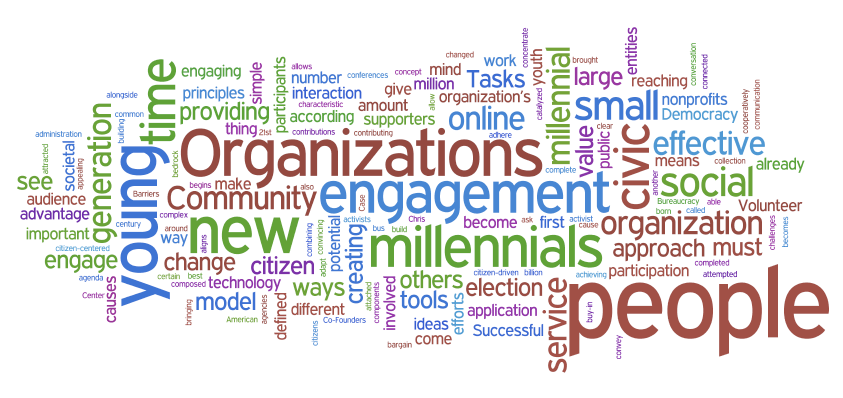As I discussed in a recent article, an online study conducted by NerdWallet and Harris Poll found that of more than 1,600 U.S. adults, 80% of taxpayers ages 18-34 who filed taxes last year and planned to file this year say they’re fearful about some aspect of preparing their taxes.
If you’re part of an accounting firm, there is no denying the importance of reaching this age group. By 2020, 46 percent of all U.S. workers will be millennials. By 2025, that number could rise to 75 percent. While the business world is making strides to attract and retain millennials as employees and customers, it’s time the accounting profession took note as well.
Understanding Millennials
Consider the events that have shaped the millennial generation—and it’s not just the relentless advancement of technology and the conveniences that come with it. Among the taxpayer age group, millennials have lived through the Great Recession, the collapse and exposure of big banks, and most are dealing with overwhelming student debt. That may be why, according to a report from JD Power, millennials tend to have a slightly more negative impression towards financial services than do Baby Boomers. As a result, fewer than 10 percent of millennials go to the IRS when they have a tax question and only one quarter seek help from a tax professional.
Another impetus for tax fear among millennials may be the rise of non-traditional income streams. After all, a zillion hits on YouTube doesn’t come with a traditional W-2. And those who work in contract or freelance jobs—the Gig lifestyle—typically don’t have taxes withheld automatically, requiring them to set up quarterly estimated tax payments on their own.
As tax preparers, we have a lead role in calming tax fears and an opportunity to better reach this emerging and vital demographic. Here’s how.
-
Embrace technology
Firms that are fully embracing technology are using it not only to boost efficiency in workflow, but provide a much more convenient experience for clients—and that convenience is essential for millennials. All firms are capable of providing the typical compliance, advisory services and financial reporting, but how it is done can be the key to future growth with this generation.
From using the cloud in your day-to-day work to offering mobile services for clients, to using social networks, immerse yourself in the latest technology and use it to your advantage. You’ll not only be attracting more millennial clients, but helping your firm run more efficiently too.
-
Establish value
To justify the cost, tax preparers must establish value. Unfortunately, many millennials are apt to view a professionally-prepared return as indistinguishable from a self-prepared one, so unless preparers can offer something more—personal financial management coaching, opportunities to maximize retirement tax benefits, etc.—millennials aren’t likely to want to start paying for something they receive for free today.
Further, value for the money is key decider for millennials. If value is not provided, millennials are most likely to jump ship. So, think about what sets your firms apart from a do-it-yourself tax preparation service for W-2-only taxpayers. For example, consider offering a “freemium” model to 1040EZ (W-2-only) millennials as a sort of incubation, with the understanding that should they become self-employed or otherwise diversify their income, their tax preparation would become a fee-based engagement. These returns cost the firm next to nothing, and lead to a long pipeline of potential new customers. What’s more, firms can require use of a web-based organizer as a condition of this service (and you know this demographic is likely to comply readily), making it virtually zero-touch for the firm.
-
Build relationships
Engage with the millennials whose tax returns you’re already preparing today. If you’re like most tax preparers with a considerable 1040 practice comprised of a significant number of Married Filing Jointly filers, you’re likely to be preparing a number of returns for their dependents with jobs, investments, and other income. However, how much do you actually interact with any of these taxpayers directly (rather than indirectly via their parents)? Are you working to build a relationship so yours is the first firm they think of when they build a business down the road, or find themselves in an otherwise more complex tax situation? You should. According to JD Power, 72 percent of millennials frequently rely on opinions of others before they buy, so chances are each one you attract will also spread the word to their (social) networks.
Firms can also build relationships with millennials by fostering their entrepreneurial spirit. Wage earners, unfortunately, do not make for good clients, therefore, firms should be investing in ways to bring about an entrepreneurial mindset among young people in the local community. This can include teaching personal financial management classes at local schools, coaching young entrepreneurs on business management, and sponsoring entrepreneurship clubs. Firms might also consider starting a scholarship to graduates of a local high schools intending to study entrepreneurship and/or accountancy to both gain brand awareness and tap into targeted social networks.
Firms that can successfully reach this emerging demographic will not only enjoy the uptick in clientele, but the stability in knowing that their firm has built a relationship with a group whose needs will continue to rise well into the future.
——————
Jon Baron joined the Tax & Accounting business of Thomson Reuters in 1992. Prior to his current position as Managing Director of the Professional segment, Jon held the positions of President of Professional Software & Services, and Vice President of Development, where he was responsible for the design and development of all Professional products and services. Jon has three decades of technology development and management experience. Jon holds a BBA in Accounting from Siena College and an MBA from Boston University.
Thanks for reading CPA Practice Advisor!
Subscribe Already registered? Log In
Need more information? Read the FAQs
Tags: Firm Management, Marketing, Staffing




